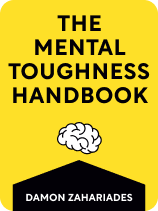

This article is an excerpt from the Shortform book guide to "The Mental Toughness Handbook" by Damon Zahariades. Shortform has the world's best summaries and analyses of books you should be reading.
Like this article? Sign up for a free trial here.
Do you ever stop to analyze what you’re feeling? What’s a simple way to win small victories throughout the day?
Author Damon Zahariades says that learning how to control negative emotions grants you mental strength and allows you to make better decisions in life. In The Mental Toughness Handbook, he offers three ways to regulate your feelings and control negative emotions.
Read on to learn how to control (or prevent) negative emotions by practicing Zahariades’s three strategies.
How to Control Negative Emotions
In The Mental Toughness Handbook, Damon Zahariades says you have to embrace, understand, and manage negative emotions to perform at your peak. If you don’t learn how to control negative emotions, feelings like anger and fear can derail you by leading you to make poor decisions or fail to take action, claims Zahariades.
We’ll explain three of Zahariades’s methods for controlling negative emotions regularly, based on the advice in The Mental Toughness Handbook.
(Shortform note: In The Subtle Art of Not Giving a F*ck, Mark Manson offers a rationale for why managing difficult feelings may help you perform at your best: Emotions are feedback tools that point you toward useful change. Negative emotions signal that you need to take action, while positive emotions signal that you’re on the right track. For example, if you feel sad that you’re alone, that’s a cue that you need company. If you feel happy that you washed all the dishes and straightened up your home and can now enjoy your calm space—that will encourage you to continue to keep your surroundings neat and tidy.)
Zahariades’s Three Methods
1. To control negative emotions, Zahariades’s first method is to rationally analyze anger, fear, and sadness as soon as they arise. Ask yourself whether the negative feeling is aligned with logic and reason and whether it’s hindering your progress.
(Shortform note: Mindfulness experts agree that you should acknowledge difficult emotions as they arise, but they recommend a different approach for dealing with them: Welcome them with kindness. When you approach challenging emotions with warm curiosity, you’ll feel more comfortable examining and trying to understand where they came from, and you’ll be better able to respond to them compassionately instead of with judgment. This will make the emotions less overwhelming and likely to control you and more likely to dissipate without incident. The more you engage in this practice, the more integrated and fluid it will become.)
2. Meditating for five minutes each day is another powerful way to control negative emotions, claims Zahariades. During this process, aim to observe negative emotions that arise without criticizing or labeling them, and challenge the veracity of negative self-talk when you become aware of it.
(Shortform note: Zahariades doesn’t go into detail about how to meditate but you can follow this guide: Find a quiet place to sit, close your eyes, take a few deep breaths, and focus just on your breath flowing in and out of your body. If thoughts or emotions arise that distract you from focusing on your breath, notice—without judging yourself—that your mind has wandered, then refocus on your breathing. To avoid judging emotions like fear, frustration, anger, and sadness, which Zahariades classifies as “negative,” recognize that no feeling is “bad”—emotions are simply emotions with no value attached to them.)
3. Zahariades also says you should practice gratitude to control negative emotions. Take a few minutes each morning, afternoon, and evening to reflect on things in your life that you appreciate, that have gone well, and that you can celebrate. Doing this repeatedly will give you small victories that trigger the reward system of your brain, leading to sustained feelings of happiness. Further, Zahariades says this practice will prevent you from hyper-focusing on things that are going poorly, which can leave you swirling in a toxic brew of disappointment and unhappiness and prevent you from making positive change.
(Shortform note: Research suggests that the simple act of writing a letter expressing gratitude can improve your mental health by shifting your focus away from toxic emotions and making it harder to ruminate. Further, this practice appears to have lasting impacts on the brain, lighting up the area associated with learning and decision-making and training it to become more sensitive and responsive to the experience of gratitude over time.)
Exercise: Practice Managing Your Negative Emotions
Zahariades says that to cultivate mental toughness, you have to manage negative emotions like anger, sadness, and fear so they don’t overwhelm and control you.
- Describe a time when you were consumed by a difficult feeling and made a decision you regretted.
- What did your inner critic say to you during and/or after the decision?
- If you find yourself in that situation again, what’s one thing you could do to manage that feeling differently?

———End of Preview———
Like what you just read? Read the rest of the world's best book summary and analysis of Damon Zahariades's "The Mental Toughness Handbook" at Shortform.
Here's what you'll find in our full The Mental Toughness Handbook summary:
- A step-by-step guide to building mental fortitude and resilience
- How to reframe failures and setbacks as opportunities
- How to develop long-lasting habits to increase your mental toughness






